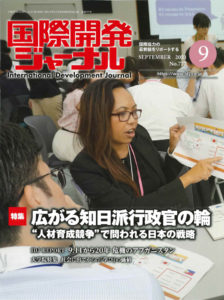IDJ-ENGLISH Human Rights Need More Consideration by Japanese Companies
IDJ-Report
Human Rights Need More Consideration by Japanese Companies
-Japan's “Public-Private Partnership” Investment is Stumbling in Myanmar
Five months have passed since the military coup in Myanmar on February 1. The military crackdown continues against civilians seeking to end violence and restore democratization, and there is no sign of improvement. On the other hand, some Japanese investment projects have been severely criticized for “benefitting the national army”. IDJ reports on the problems of Japanese investment in post-coup Myanmar. (Yukifumi Takeuchi)
Emphasizing practical business
Based in Yangon, Myanmar’s commercial capital, there is an international NGO that is promoting quiet signature movements among business communities. The Myanmar Centre for Responsible Business (MCRB) was originally established by the UK's Institute for Human Rights and Business (IHRB). Since February 19th, the statement by “Concerned Businesses Operating in Myanmar” has been posted on its website.
”As investors, we inhabit a ‘shared space’ with the people of Myanmar, including civil society organizations, in which we all benefit from respect for human rights, democracy and fundamental freedoms – including freedom of expression and association - and the rule of law. The rule of law, respect for human rights, and the unrestricted flow of information all contribute to a stable business environment”.
“We remain committed to our employees and to the people of Myanmar. We hope to see a swift resolution of the current situation based on dialogue and reconciliation in accordance with the will and interests of the people of Myanmar.”
MCRB is asking foreign and Myanmar companies that are expanding into the country to sign the statement. They seem to be trying to avoid clashing head-on with the military, acting with a calm demeanor from the perspective of a “practical business” position, saying that “the law, democracy, and respect for human rights are essential for business.” As of early June, 233 companies have signed, according to a list posted on its website homepage. In addition to the food and beverage industries such as Coca-Cola, Nestlé, Carlsberg, Heinekens and KFC, well-known companies in the United States and Europe such as Unilever, H&M, and Facebook.
The Japanese companies have the names of local subsidiaries such as Denso Co., Ltd., Kubota Co., Ltd., H.I.S. Co., Ltd., and Nishimura & Asahi Myanmar Limited.
The head of MCRB is a former British diplomat who also served as ambassador to Myanmar (2002-06). She is fluent in Burmese and was a secretary at the embassy in the 1990s. MCRB mediated a dialogue between the Japan International Cooperation Agency (JICA) and the local residents of the Thilawa Special Economic Zone.
The statement also includes Japanese, Chinese, and Korean translations, and also asks Japanese, Chinese, and Korean companies to sign it. It might be Ms Bowman’s idea who is familiar with Japanese diplomacy and trends among Japanese companies.
However, an executive of a certain Japanese company is reluctant to respond to the MCRB movement. He cares about his company being glared at by the Myanmar military if his company signs it.
However, as enshrined in “the UN’s Guiding Principles on Business and Human Rights”, companies need to take steps to prevent human rights-related risks. It means that in Myanmar, business should not be involved with the military, which is clearly committing criminal acts that are serious human rights violations.
The eyes of the international community increasingly harsh against the military
After the coup, the investment risks held by Japanese companies became clear. A large complex building under construction near the Shwedagon Pagoda, a famous ancient temple in Yangon. It is "Y Complex", already reported in the Myanmar Special Feature Stories of this magazine, IDJ, in May edition.
A major real estate development company, Tokyo Tatemono Co., Ltd., a general construction company, Fujita Co., Ltd., and Japanese government-based Japan Overseas Infrastructure Investment Corporation for Transport and Urban Development (JOIN) invested a total of approximately 36 billion yen. After completion, Japanese Hotel Okura, apartments and commercial facilities are supposed to move in. According to Justice for Myanmar, a local NGO, the land is where the military museum was previously located and owned by the military, and more than 200 million yen a year in rent for that real estate is paid to the Ministry of Defense under the Military.
The question that came to mind when I heard this, was whether there were any objections to this public-private partnership project in the process of making investment decisions, including from government agencies. In particular, the Japan Bank for International Cooperation (JBIC), Mizuho Financial Group, Inc., and Sumitomo Mitsui Financial Group, Inc. decided to co-financing a total of 16 billion yen in December, 2018.
The Rohingya refugee problem had already been highly controversial before this. Myanmar’s strong military was severely criticized by the international community, and the NLD government at the time was shaken. However, was no risk pointed out during the process of investment decision? Why was this business given the go-ahead?
The IDJ team of journalists requested explanations from the companies involved and received certain responses regarding this project; Tokyo Tatemono Co., Ltd., JOIN, JBIC, Mizuho Financial Group, Inc. and Sumitomo Mitsui Financial Group, Inc.
IDJ received responses from most of these companies. As the central position of this project, here we introduce written answers from Tokyo Tatemono and JOIN.
The details of the business decision could not be disclosed as “business confidentiality.” But “the local operating company has rented the site from a Myanmar joint venture company. The company has borrowed the land from the Ministry of Defense, an agency of the Myanmar government. But we recognize that the ultimate beneficiary is the Government of Myanmar, not the Ministry of Defense.” They also stressed that they strictly complied with laws and regulations, saying, “We also conducted studies about the country’s related laws and regulations, related permits, etc., concerning this project, as well as the U.S. Burmese Economic Sanctions Regulations concerning business partners and confirmation of various regulations under the Foreign Asset Management Act.”
There seems to be a point in the view that “the ultimate beneficiary is not the Ministry of Defense, but the government”. However, in Myanmar, the national defense budget is not obligated to disclose information under the constitutional provisions. The whereabouts of the funds paid is unclear.
“Japanese companies only emphasize the legal risks and are willing to do so if there are no legal issues. But they don’t think highly of stakeholder risks (such as business partners) ,” Bowman said.
During the former military rule of the State Law and Order Restoration Council (SLORC) in the 1990’s , I often saw Japanese expatriates playing golf with senior military officials at the military golf club in Yangon and building connections. Including other Asian countries, it was a show of the skill of the corporate warrior to deeply engage with the regime of the development dictatorship.
Now, however, the times have changed dramatically. The international community’s eyes are on the military rule and are becoming increasingly critical. Business with the military, which tramples on Myanmar's hard-fought democracy and continues to crack down on human rights, will not work.
“International Development Journal”, July edition, 2021
*****以下、日本語原文*****
IDJ REPORT
人権配慮必要な日本企業
ミャンマー つまずいた日本の“官民連携”投資
2月1日にミャンマーで起きた軍事クーデターから5カ月が過ぎた。暴力停止と民主化を求める市民に国軍の弾圧は続き、事態が改善する兆しは見えない。その一方、一部の日本の投資案件が「国軍を潤わせている」と厳しく批判されている。現地識者の見方も紹介しながら、日本の投資の問題点を報告する。
ビジネスの“実利重視”を強調
ミャンマーの商都、ヤンゴンを拠点に、静かな署名活動を展開している国際NGOがある。英国の人権ビジネス研究所(IHRB)が設立した「ミャンマーセンター・フォー・レスポンシブル・ビジネス(MCRB)」だ。2月中旬から「ミャンマーで操業している企業の懸念」についての声明文をHPに掲載している。
「投資家として私たちはミャンマーの人々と共通の空間に住み、人権の尊重、民主主義、表現の自由と結社の自由を含む基本的自由、法治の恩恵を享受している。法治、人権尊重、そして自由な情報のやりとりが安定的なビジネス環境に資する」「私たちは、ミャンマーの人々の意志と利益に合うように対話と和解に基き、現在の状況が迅速に解決されることを願っている」
MCRBは、現地に進出している外国企業やミャンマー企業に対し、声明文への署名を求めている。強権を奮う国軍と正面から衝突するのを避け、「ビジネスには法治と民主主義、人権尊重が不可欠」と、“実利の視点”から冷静な口調で訴える作戦をとっているようだ。
HP掲載のリストによると、6月10日現在、署名した企業は233社。コカコーラやネスレ、カールスバーグ、ハイネッケン、KFCなど食品・飲料業界のほか、ユニリーバ、H&M、フェースブックなど米欧の有名企業が目立つ。日本勢は(株)デンソー、(株)クボタ、(株)エイチ・アイ・エス、西村あさひ法律事務所などの現地法人の名前がある。
MCRBの所長は元英国外交官で、駐ミャンマー大使(2002~06年)も務めたヴィッキー・ボウマン氏。ビルマ語も堪能で1990年代には大使館で書記官を務めた。MCRBではティラワ経済特別区に関し、国際協力機構(JICA)と住民の対話を仲介した。今回の声明文は日本語、中国語、朝鮮語訳も掲載し、日中韓企業にも署名を求めている。日本外交や日本企業の動向にも詳しいボウマン氏の発案だ。
ところが、開発関係者の間では有名人である彼女の呼びかけに、ある日本企業の幹部は渋い表情だ。署名によって自社がミャンマー国軍から睨まれることを気にしているのだ。しかし、国連の「ビジネスと人権に関する指導原則」にも謳われているように、企業は人権関連リスクを防ぐ手立てを講じる必要がある。それは、ミャンマーにおいては、明らかに重大な人権侵害の犯罪行為を犯している国軍とビジネスで関わり合うべきではないということだ。
軍政に厳しさ増す国際社会の目
クーデター後、日本が抱え込んだ投資リスクが明らかになった。商都ヤンゴンの古刹、シュウェダゴン・パゴダの近くに建設中の大型複合ビル。本誌5月号のミャンマー特集でも紹介した「Yコンプレックス」である。不動産開発大手の東京建物(株)、ゼネコンの(株)フジタ、政府系の(株)海外交通・都市開発事業支援機構(JOIN)などが総額360億円を投じた。完成後はホテルオークラのほか、住宅、商業施設が入居するはずだった。
地元NGOのジャスティス・フォー・ミャンマーによると、この土地は国軍が所有する軍事博物館があった場所で、不動産の賃料として年2億円余りが国軍傘下の国防省に支払われる。
これを聞いて浮かんだ疑問は、この官民連携事業について政府系機関も含めて投資決定の過程で異議が全く出なかったのか、ということだ。特に国際協力銀行(JBIC)とみずほ銀行、三井住友銀行は2018年12月に総額160億円の協調融資を決めたが、これ以前の段階ですでにロヒンギャ難民問題が大きな論議を呼んでいた。ミャンマー国軍の強権姿勢が国際社会の厳しい批判を浴び、当時のNLD政権も大揺れした。なのに何のリスクも指摘されず、この事業にゴーサインが出たのか。
本誌編集部は関係する企業に説明を求め、東京建物、JOIN、JBIC、みずほ銀行、三井住友銀行から一定の回答を受け取った。東京建物とJOINからはほぼ同じ内容ながら、書面回答を得たので以下、紹介する。
事業決定の詳細は「ビジネス上の守秘事項」として明らかにしないが、「現地事業会社は本件事業用地を合弁相手であるミャンマー企業から転借し、地代を支払っている。この企業が当該土地をミャンマー国政府の一機関である国防省から借り受けているが、最終的な受益者は国防省でなく、ミャンマー国政府であると認識している」という。また、「本事業に関する同国の各種関連法令、関連許認可等について調査並びに事業提携社に関する米国のビルマ経済制裁規則並びに外国資産管理法による各種規制内容の確認等の調査も実施した」とし、法規制を厳守している点を強調した。
「最終的な受益者は国防省でなく、政府だ」との見解は一理あるように思うが、ミャンマーでは憲法の規定で、国防予算は情報開示の義務がないとされ、そこに支払われる資金の行方は不透明この上ない。
ボウマン氏は「日本企業は法的リスクばかりを強調し、法的に問題なければOKだとの姿勢だが、(ビジネスの提携相手などの)ステークホルダー・リスクを軽んじている」と指摘する。さらに「日本の市民社会は欧米ほど強くないが、市民社会は企業にもっと強い圧力をかけるべきだ」という。
かつて1990年代の軍政時代、ヤンゴンにある国軍のゴルフ場では、軍幹部とプレイを共にして人脈を築く日本企業駐在員の姿をよく見かけた。他のアジア諸国でも、開発独裁の政権に深く食い込むのが、企業戦士の手腕の見せ所とされた。だが、今や時代は大きく変わった。軍政に対する国際社会の目は段違いに厳しさを増している。民主主義を踏みにじり、人権弾圧を続ける国軍とのビジネスは成り立たない。(本誌編集委員・竹内幸史)
『国際開発ジャーナル』2021年7月号掲載記事


